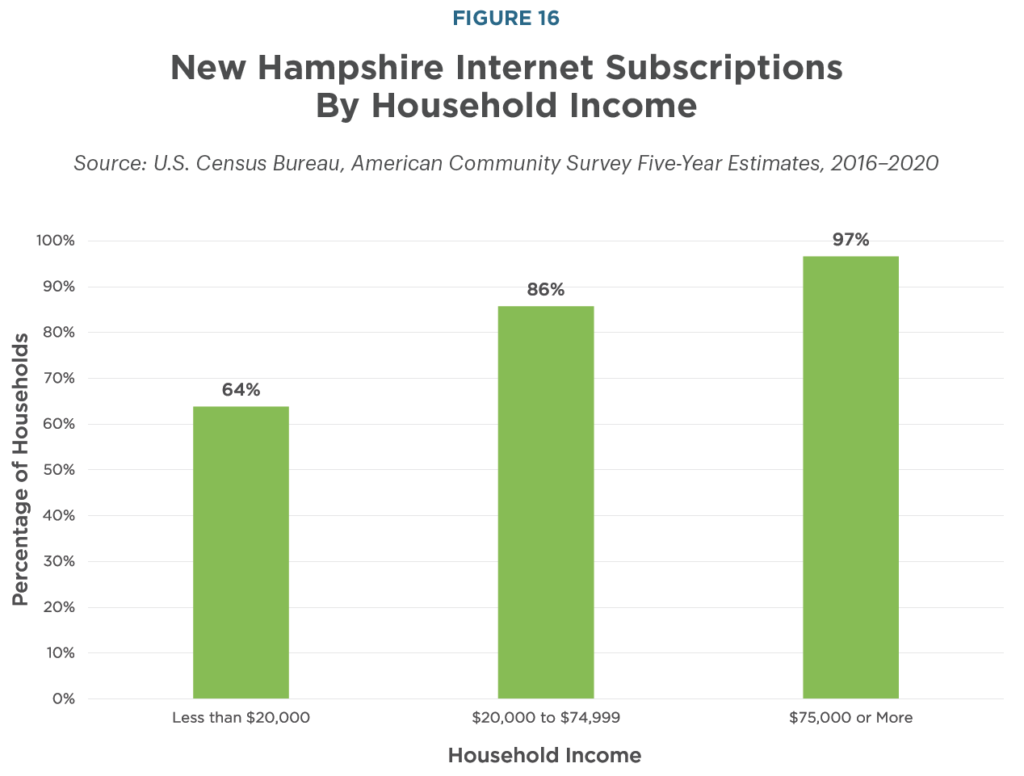This first edition of New Hampshire Policy Points provides an overview of the Granite State and the people who call New Hampshire home. It focuses on some of the issues that are most important to supporting thriving lives and livelihoods for New Hampshire’s residents.
New Hampshire Policy Points is intended to provide an informative and accessible resource to policymakers and the general public alike, highlighting areas of key concern. Touching on some important points but by no means comprehensive, each section within New Hampshire Policy Points includes the most up-to-date information available on each topic area as of October 2022.
The following section, Broadband Internet, is one of nine sections that frame this resource guide. Other sections cover Population and Demographics, Income and Economic Security, Economy and Jobs, Housing, Health, Education, Transportation, and How We Fund Public Services. The facts and figures included within this book provide useful information and references for anyone interested in learning about New Hampshire and contributing to making the Granite State a better place for everyone to call home.
To purchase a print copy or download a free digital PDF of New Hampshire Policy Points, visit nhfpi.org/policypoints
The internet is increasingly important to successfully accessing education, health care, information resources, goods and services, and job opportunities in the modern economy. Expanding access to broadband infrastructure, especially in rural areas where access to high-speed internet is more limited, is linked to growth in both population and jobs, more new businesses, higher property values, and lower unemployment rates.
Internet Coverage in New Hampshire
According to U.S. Census Bureau data collected during the 2016 to 2020 time period in New Hampshire, an estimated 93.7 percent of Granite Staters were in a household with a computer or smartphone, tablet, or other type of computing device, while 84.5 percent specifically had a desktop or laptop in that period. About 88.8 percent of Granite Staters resided in households with some form of broadband internet subscription, including a cellular data plan or a satellite connection; 79.9 percent had a cable, fiber optic, or DSL broadband subscription, excluding cellular and satellite plans. About 10.8 percent of all Granite Staters did not have any type of internet subscription, while 6.3 percent of Granite Staters did not own any type of computing device, including a smartphone or tablet. Approximately 4.6 percent own only a smartphone and no other form of computing device.
An assessment from BroadbandNow, a national research organization that uses both public and private-sector data to estimate internet access, ranked New Hampshire 23rd among the 50 states and the District of Columbia in its 2022 report based on wired or at-home wireless internet coverage, speed, and price. BroadbandNow estimated that about 89.6 percent of New Hampshire residents could locally access broadband internet based on the speeds the U.S. Federal Communications Commission defines as “broadband,” which requires connection speeds at 25 megabits per second download and 3 megabits per second upload.
Cost of Internet Access
While broadband internet coverage carried by wired infrastructure reaches most Granite Staters, the price of internet service may be cost prohibitive for many people. BroadbandNow calculated that only 36.4 percent of residents have access to a wired internet plan that would cost $60 per month or less. This access varied across states, with 88.5 percent of Rhode Island residents having access to these low-priced wired broadband plans, and only 4.5 percent of Maine residents and 1.1 percent of Vermonters having this access.
Higher prices limit broadband access, particularly for households with lower incomes. While only 3.4 percent of Granite Staters in households with incomes greater than $75,000 annually did not have an internet subscription in the 2016 to 2020 period, that figure was an estimated 36.2 percent of New Hampshire households with incomes less than $20,000.
Investments in Broadband Access
State and federal investments have sought to expand access to broadband internet services in New Hampshire. In 2020, the State devoted flexible federal funds associated with COVID-19 relief efforts to improving broadband infrastructure. Two significant federal laws passed in 2021, the American Rescue Plan Act and the Infrastructure Investments and Jobs Act, both devoted funds to broadband infrastructure. American Rescue Plan Act funds were allowed to be deployed flexibly by states and communities.
The federal government also established a permanent program, following a temporary pandemic-era assistance program, to provide people with low incomes with discounts of up to $30 per month on their internet subscription bills.
Access to broadband can help Granite Staters find employment and connect to education and health services in an efficient and cost-effective manner. Enhanced access for households with fewer resources and those living in rural areas can help promote better health and economic outcomes and boost upward mobility.
• • •
This publication and its conclusions are based on independent research and analysis conducted by NHFPI. Please email us at info@nhfpi.org with any inquiries or when using or citing New Hampshire Policy Points in any forthcoming publications.
© New Hampshire Fiscal Policy Institute, 2022.


